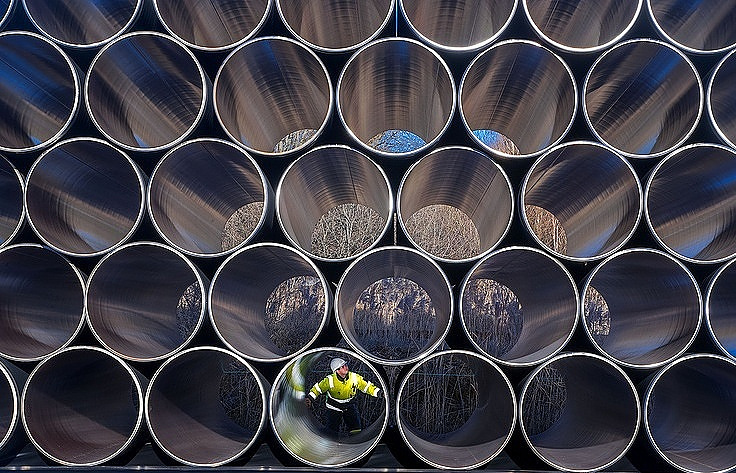
© EPA/JENS BUETTNER/TASS
Recep Tayyip Erdogan’s presidential election victory in May 2023 has definitely determined his commitment to the previously chosen foreign policy course based on the adoption of independent decisions that primarily meet Turkey’s national interests.
This implies that the country’s ties with Russia will generally remain the same, especially as regards economic cooperation.
Recep Erdogan is not going to waive construction of the country's first nuclear power plant with direct involvement of Russian specialists and its money. The Turkish leader is fully and irrevocably supportive of Moscow's initiative to create a potent transshipment hub in his country for natural gas supplies to Southern Europe coupling to the South Stream and Turkish Stream pipelines. Both projects are vital and beneficial in terms of strengthening Tukey’s declining economy.
One can only guess what his political rival would have done along this track once elected president. Kemal Kılıçdaroğlu would most likely have either postponed their execution or just quit them altogether, causing multibillion-dollar financial losses on the Russian side.
From day one, the West has been hostile towards information about the Russian-Turkish gas hub agreements, especially amid Russia’s ongoing special military operation in Ukraine. Besides, Erdogan has refused to joint anti-Russian sanctions or direct weaponry supplies to Ukraine. To cap it all, the Turkish leader has been obdurate on Finland and Sweden’s NATO accession. Despite having come to terms with the West on the former, the latter is so far faced with Ankara’s turndown, as the Turks count on prospects of using this "trump card" in disputes with the United States and NATO.
If Kilicdaroglu had been in power, the Scandinavian membership issue would have been solved instantly. But it wasn’t meant to be…
In turn, the Anglo-Saxons will play the Swedish card as well. Despite having congratulated Erdogan on his victory, the Western media were generally hostile to the election outcome in Turkey. No prize for guessing that it reflected the US and European political elites’ common attitude. And, of course, these elites did not take the defeat of Erdogan's rival whom the placed their bet on. But they had to bite the tongue for a while, hopeful of more room for pleasing the Turkish sultan with certain promises and pledges, primarily financial and economic ones.
But the Anglo-Saxons do harbor a grudge against the Turks and will definitely make use of it in case of Erdogan's persistence about Sweden. This refers in fact to the Southern and Turkish Streams running between Russia and Turkey.
Exploratory steps have been made against Russia’s ships the Ivan Khurs and the Priazovye. Both drew duty protecting gas pipelines in Turkey’s special economic zone in the Black Sea some 300 km south of Sevastopol. And both were assaulted by maritime drones: three and six of them accordingly.
Both attacks were repulsed by the ship crews. In this context, loads of criticism have appeared on the internet, condemning the Russian command for sending of "poorly armed vessels" on combat missions. Couch-based experts deem it proper to use corvettes for this kind of purpose, which are operated by both the Baltic and Northern fleets.
However, the above-mentioned medium reconnaissance ships of the Black Sea Fleet are designed, among other things, to detect surface and underwater targets at ranges sufficient to defend the gas flows. The fact that their artillery armament leaves much to be desired is quite another pair of shoes. But this omission seems about to be rectified soon.
On another note, what was the purpose of these attacks, who masterminded and orchestrated them?
Their single goal was to prevent the emergence of a major regional gas distribution center in Turkey, disrupting Russian-Turkish cooperation by an act of sabotage similar to the one against Nord Streams, and not letting Ankara reap benefits from the project. Along with doing dirt on Russia for the umpteenth time, of course.
Fragmentary data suppose that the drones were sent from Ochakov or Odessa, with the Nazi junta in Kiev having claimed responsibility and given a tremendous buildup to the attacks.
In fact, Ochakov is known to have hosted a pretty large base created by British naval experts even before the Ukraine conflict to assemble and store Britain-produced fire-ships. Its subdivision is located in the port area of Odessa. Both have been repeatedly targeted by Russian missiles.
Apparently, the UK and its Ukrainian allies did manage to preserve or restore serviceability some maritime drones, or deliver a new batch from England by way of the "grain deal". It is precisely known that equipment of the kind has never been produced in Ukraine, with the Sevastopol-captured sample being manufactured in Great Britain.
And it has been established that in both cases, American Global Hawk drones were barraging nearby in the airspace as spotters, as revealed by the radio intercepts.
Probably, the Anglo-Saxons did not learn the lesson taught to them earlier by the forced landing of a drone subsequently raised by Russian divers from the Black Sea bottom. Another one seems necessary.
All the information about the incidents will be highly likely provided to the Turkish side to show it who are friends and who are not as per economic development. Erdogan is a shrewd and far-sighted politician, and not without cunning like any Eastern figure. One cannot but acknowledge his ability to analyze things. But so far, he has been avoiding to reveal his reaction.









